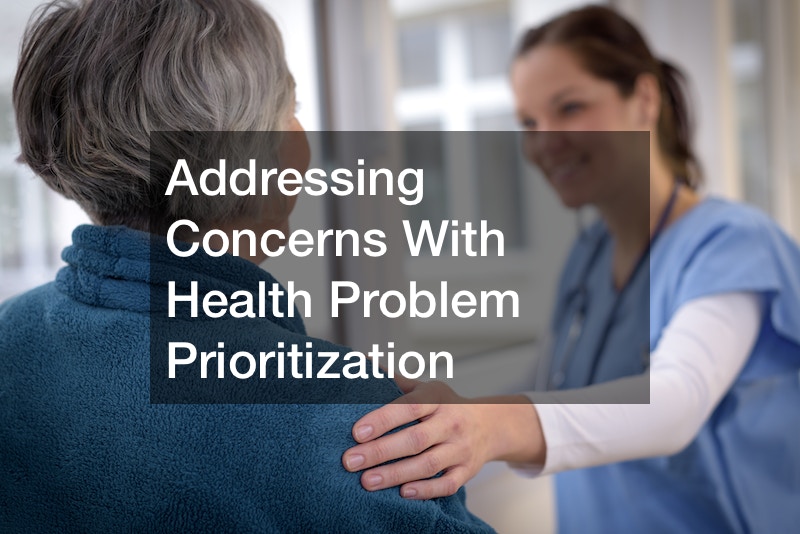

When you’re interested in managing your healthcare, it’s important to prioritize health problems. This allows you to get timely and appropriate care. When addressing health problem concerns, you must find the right care providers and manage specific health issues. This guide explores several topics related to addressing concerns with health problem prioritization.
Finding a Routine Care Provider
Having routine care is an important and significant part of maintaining overall health. When you have routine care, you can prevent future problems by finding concerns before they become major problems. When you meet with your primary care provider, you want to have a clear understanding of their role. It’s best if you create a long-term relationship with your primary care doctor to ensure they have a better picture of your and your medical history. When you have regular check-ups, you can participate in preventative screenings that can help detect problems.
When you’re looking for a primary care provider, including doctors and a dentist, there are some tips to consider. You can use online directories and read reviews to help narrow down your focus. You should consider if they accept your insurance and how close they are located to you. If they are far away, it may not seem like a big deal until you have to make a number of trips to see them.
When thinking about problem prioritization as part of your routine care, you want to understand how different providers assess health conditions. It’s also helpful to know how they prioritize concerns. You want to know how a doctor you select might triage patients based on the severity and urgency of conditions and symptoms.
Tackling Teeth Alignment Issues

When considering health problem prioritization, you may want to put any concerns you have about your teeth at the top of the list. If you have any misaligned teeth, you should understand the impact it can have on your oral health. It can also impact your self-confidence and appearance. You should understand that there could be potential long-term consequences if you don’t seek treatment for your teeth alignment issues. If you have problems with teeth alignment, you should consider visiting an orthodontist.
Orthodontists are experts in diagnosing and treating teeth alignment issues. When you talk to an orthodontist, you can discuss all the various treatment options available. This includes options like braces, clear aligners, and retainers. You also want to discuss and consider the length of the treatment, the cost, and how it could impact your lifestyle.
An orthodontist prioritizes treatment plans by looking at factors like the severity of misalignment, age, and the preferences of the patient. It’s important that you have open communication with your orthodontist to ensure that you have effective problem prioritization for your needs. You want to have a complete understanding of your alignment problem and how it will be corrected.
Improving Your Smile
When you want to improve your smile, dental implants may be a consideration for you. First, you must understand what dental implants are and how they work. They are ideal for replacing teeth if you are a good candidate for them. The many benefits of dental implants include improving your speech and ability to chew. They can also improve the way you look.
When considering implants, it’s important to have proper problem prioritization. When you want to move forward with implants, you should have a consultation with a dental implant specialist. This could include a prosthodontist or oral surgeon. When you meet with a professional, you want to understand the evaluation process, which typically includes an assessment of your bone health. During the assessment, the doctor determines if you’re a good candidate for implants.
When considering this type of treatment plan, you must consider recovery time, price, and any long-term maintenance you may have. You want to understand how specialists prioritize treatment based on your needs and expectations. You should also understand the potential challenges you may face. You want to know if implants will address your immediate functional concerns and long-term aesthetic goals.
Locating Assistance for Your Loved Ones

At some point, you may realize a loved one needs home care services. You may begin to see that your loved one is having difficulty handling their own needs throughout the day. This could be a sign they need help. If your loved one is managing a chronic condition, they also may need help.
Finding the right home care services means finding a place that ensures safety but also promotes independence. You want to find a provider that enhances the quality of life of your loved one. To find the best home care services, you should do some research before making a selection.
You should know what type of care your loved one needs. They may need someone to help them manage medication and make meals or they could just need a companion during the day or evening. You want to know the reputation of all your options and understand their qualifications. Additionally, learn how a home care group handles problem prioritization. You want to guarantee that the needs of your loved one are cared for appropriately and that there’s a balance between personal independence and safety.
Handling Issues at Home
When you have concerns at home, you need to understand what they’re so you can apply problem prioritization strategies. You may have a minor issue, such as a broken door hinge, but you could also have a more significant issue, like bed bugs. You want to recognize the signs of bed bug infestations and understand the potential health risks associated with them. Quick intervention is important and you should hire a professional pest control services company to address the infestation within your home.
When you have this problem, you may not have a lot of time to research and select reputable pest control companies. You want to find one that specializes in bed bug control and extermination. They may use different methods, such as heat treatment, chemical treatments, or integrated pest management.
Most professionals prioritize treatment based on factors including infestation severity, areas affected, and your needs. You want to ensure that whatever company you pick, they understand the importance of ongoing monitoring and preventive measures. Being proactive in preventing future problems can give you peace of mind and allow you to enjoy your home again.
Managing Severe Pains

When you have severe pain, especially if it’s a chronic condition, you want to find a doctor that is going to understand your problems. Managing or getting rid of your pain is going to be critical. Severe pain has a significant impact on physical and mental well-being. Find pain management doctors that recognize the significance of your pain and can help you manage it. You want to understand how any doctor you select diagnoses and treats chronic conditions.
Consult specialists who understand your condition and its side effects. When you meet with a new pain management doctor, you want to understand how they evaluate patients and conditions. You should know they’ll want to review your medical history, request diagnostic tests, and create personalized treatment plans.
Take time to understand your treatment options, any side effects, and your long-term pain management goals. Ensure there is open communication between you and your doctors so you can be well-informed about your treatment path. There has to be a balance between your needs and realistic treatment goals. While some problems have quick solutions, others may require patience.
Working With the Appropriate Care Provider
It’s critical that you work with the appropriate provider to fit your needs. There are many specialists in a wide variety of areas. It’s helpful if you know what type of specialist you need so that you don’t go down the wrong path with problem prioritization.
Physicians will be clear with you about what they can and cannot treat. This also applies to sports medicine physicians. When you have an injury or condition because of sports or physical activity, you should consult a sports medicine doctor. They are the best to diagnose, treat, and help prevent these types of injuries.
Prioritization is key in these cases because it can help or hurt your timeline for recovery. A sports medicine doctor will examine you and learn your medical history. They may use X-rays or other imaging studies to create a care plan, including rehabilitation. You and your doctor must communicate openly about your recovery and a realistic recovery time. You want to ensure you have enough time to heal and prevent further injury.
Getting Back on Your Feet

After an injury or surgery, you may need physical therapy. There are many benefits to physical therapy, including the ability to restore movement, mobility, and function. A physical therapist can help create a personalized treatment plan that’s based on problem prioritization. You want to consult with a licensed physical therapist in your area that specializes in the specific area of need. Your care plan will consist of physical therapy treatment sessions and home exercises.
You want to know how a physical therapist prioritizes treatment sessions. You also want the treatment to be based on your condition, goals, and progress. You will most likely need a balance between immediate pain relief and long-term functional improvement. When it comes to physical therapy, you must be an active participant in your recovery. This is going to require regular communication and feedback.
Maintaining a Healthy Diet
Nutrition is an important part of your health. When you eat a balanced meal, you can help prevent chronic diseases and have overall improved health. You can get help when creating a healthy and balanced diet for yourself. There are many experts, including nutritionists, that can help.
When you meet with a professional, you want to provide your problem prioritization by explaining what’s most important to you. This could include your energy level, mental health, or disease prevention. A professional can help you understand the different ways you can balance your diet even when living a busy life. They can also shine a light on conflicting and incorrect dietary information.
Healthy food doesn’t have to be boring or nasty. You can be creative with your healthy food options. You can consider acai bowl restaurants and other places that offer convenient but healthy food options. It’s important that you vary your menu and change the ingredients you’re eating so you don’t get bored.
Another consideration is portion size. A professional can help you understand proper portions. You want to place emphasis on creating long-term healthy habits that are sustainable. You may have to make some lifestyle changes, too. All of these changes can help you maintain a healthy diet.
Fighting for Your Rights
Medical diagnoses and treatments can be delayed if you go to the wrong doctor. You may need to consult a delayed cancer diagnosis lawyer depending on the situation. With this professional, you can discuss the potential consequences of a delayed cancer diagnosis. This includes complications with treatment and a reduced survival rate. A lawyer helps you understand the legal process, such as case evaluation, evidence collection, and potential compensation.
When you consider consulting a lawyer, you want to look at their knowledge, experience, and track record. You want to understand how a lawyer you choose handles problem prioritization of your case. Most likely, they will look at the evidence available, the severity of the harm to you, and the legal feasibility of the case. What’s most important is that you understand that you have rights when it comes to your health and a delayed diagnosis. A lawyer can help you decide what your next steps should be.
It’s important that you address any concerns you have with health problem prioritization. This is critical to ensure you have the support and care you need. When you understand the role of different care providers, you can more easily navigate the healthcare system. You can also be more effective in receiving treatment.


